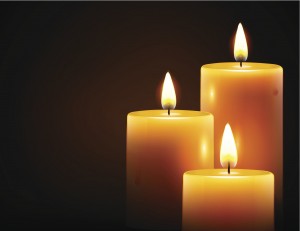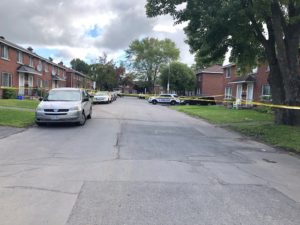[5-minute read]

They must be wind-protected. (Photo from National Candle Association, literally not metaphorically.)
It was a relief when the police tape came down, but it hasn’t felt the same, not yet. Maybe it’s just imagination, but Whitton Crescent seems a lot less lively now. Shocking violence can do that to a neighbourhood, and it’s not only the besieged and grieving family that will never fully recover from that terrible morning in early September. The perpetrators — just kids, really — and their families are also ruined in their own particular ways. It was another sad day in, and for, Overbrook, my little piece of Ottawa, where a curvy little street is named for Charlotte Whitton, first female mayor of a Canadian city.
It’s a question that came up in my living room on the weekend: Aren’t you afraid to live here? The answer, sadness aside, is a simple No. We chose this area when we moved to Ottawa. We love it. My family lives two blocks from the murder scene, and from the shooting the week before, which we learned to our dismay injured a lovely woman we know well. We’re a two-minute bike ride from the shooting at the “four corners”, where the convenience store and the pizza restaurant have seen too much of this kind of criminal traffic. Though we don’t fear for our own safety — without a doubt my daily commute across town to my high school coaching gig is more dangerous than where my house sits — it’s unsettling. As for everyone in Overbrook, but especially those on Whitton or near the four corners, these events feel far too close to home. So what are we to do? My wife and son and I are privileged folk in many ways, including our relatively easy option to move out, but that has never crossed our minds. Nor have we considered extra home security, spending less time walking or biking the streets, or (God forbid!) getting suspicious or cold towards our neighbours.
Just the opposite, actually. If darkness has sometimes fallen on my part of town, the thing is to get to work and create more light. “Better to light a candle than to curse the darkness,” as the ancient proverb says. When violence strikes at the heart of community, if the threat of it erodes our hopefulness and our trust in each other, then we have TRULY lost. The better course? Build more community. We started by asking what we might be able to do for the victims’ families? We’re trying to go beyond that: what are we already doing that involves us with Overbrook folk or local development? How do we do more of that? We wonder, What’s missing in this area? and then look to take some small action to begin to fill in that gap. Doing something helps us, first, and let’s hope it ripples outward, but mindset is critical.

To think it happened on Whitton! The police tape and blocked streets lasted almost a day. But there’s so much great stuff here, too.
We should start by examining our own thoughts. Overbrook is seen by some in Ottawa as a rising real estate opportunity, an “up-and-coming neighbourhood” where gentrification is in full swing — which stands in blunt contrast to the broad perception that notre quartier is crime-infested and dangerous. For me, neither of those extremes even come close to the heart of the matter. There are many things to treasure and enjoy about where we live: easy access to the Rideau river parkland, our closeness to downtown Ottawa, the mingling of French and English, and our neighbourhood’s superb diversity of cultures and backgrounds. (And the outdoor basketball courts!)
But I’m thinking especially of what’s just around the corner from me. When I ponder the brief arc of Whitton Crescent, this is what comes to mind, and I am committed to keeping it that way:
· The coolest Canada Days I’ve ever experienced were led by an older woman named Betty, who canvassed area stores and businesses and spearheaded a street celebration with games, ice cream, face-painting. She got lots of help, I’m sure, and the result, for a few years after we moved to Overbrook in 2002, was a joyful, kid-friendly, heartwarming day. I’ve never felt more proud to be Canadian than on Whitton.
· Khadijeh runs her day-care there. She’s graceful and kind, and we were so happy to have our child loved and protected and befriended right where the road bends on Whitton.
· We wave or chat with Steph and her friends and family, kids running around, everybody outside together as the sun goes down on Whitton. (That’s not happening so much now. I hope that changes soon.)
· We remember friendly welcomes when involved in some community outreach or another, such as that warm conversation at Tessie’s place on Whitton.
· I ran into Aliya recently, whom I’d known when she was a high-school basketball player and an all-around smart, lively girl. This young woman still likes to play some ball, but now she is an architect, beginning her career, showing what somebody can do if she grows up on Whitton.
· One hot afternoon a few years back, the happy shrieks of children drew us to a front lawn where Lance was leading a bunch of neighbourhood kids in a wacky, action-packed relay involving, if I remember rightly, balloons, cups of water, hula hoops and a home-made waterslide. It was ridiculously fun to watch, and nobody was enjoying it more than 20-something Lance (another good one who’s moved away) Yup, that happened on Whitton.
· We joined in an Overbrook Community Association scheme called Starry Nights this summer. Of the four venues, the one nearest our place was where Whitton Crescent meets our road. Cars were blocked off, so Whitton was filled with chalk drawings, singing, good food and good people. The hotdogs and popsicles, hummus and rice, the church choir and the puppets and all that music (and the fire-dancer!) were all just tasty excuses to get out and enjoy a July evening and meet our neighbours. That’s what can happen on Whitton.
· Starry Nights preparations took us to the front doors of people like Laila, Santiago and Matthew, three new friends whose families heartily joined in the planning and work to make a community celebration really sizzle! These are the kind of people who live on (or near) Whitton…
There has been sorrow and tragedy on these streets. We remember. Griefs need to be eased and hearts reassured. The Persian sage ‘Abdu’l-Baha said it well: “There is nothing so heartbreaking and terrible as an outburst of human savagery.” He was speaking of the massive suffering of World War I, but smaller infections of violence are a heartpunch, too, in a little place like ours. The challenge is to not allow darkness to fall unchecked, but rather to focus on examples and opportunities to put our our hearts and hands on peace-making, love-generating, and unity-building, on lighting those candles. What good deeds can better these few hectares we call home? It starts with our own street, and extends throughout Overbrook. (And Ottawa. And the country, and the planet, but today we’re thinking and hoping locally.)
Anybody got a light?
